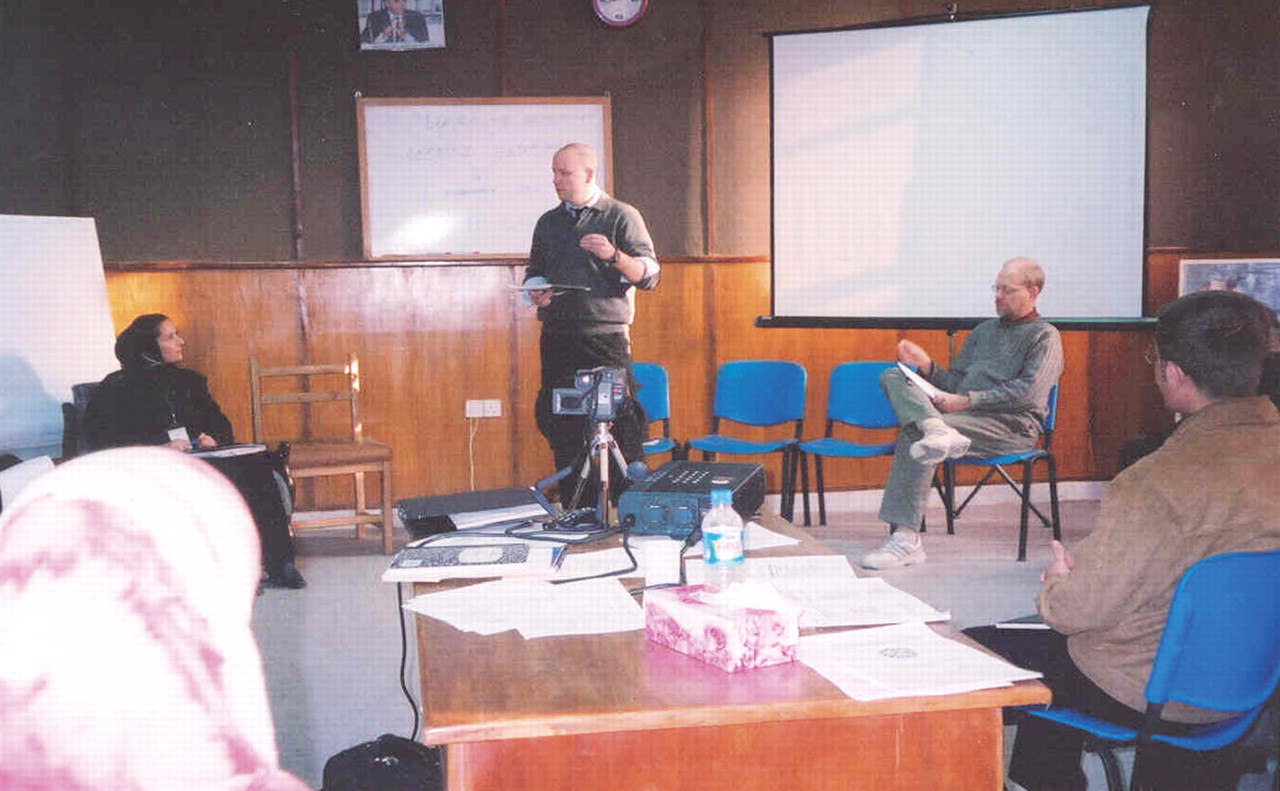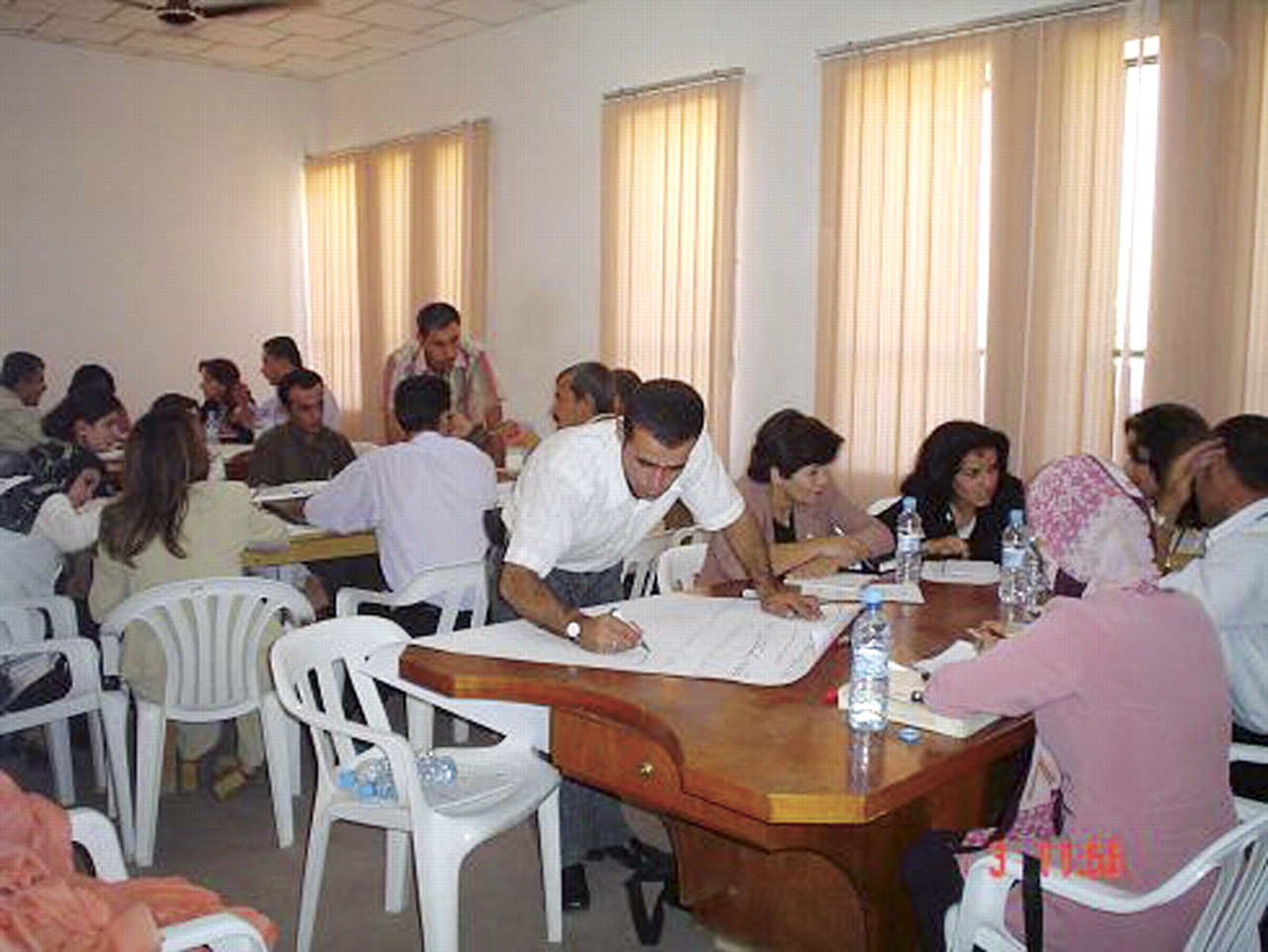Iraq's attempts to rebuild its mental health services, allowed to grow moribund under the former regime, are complicated by low staffing levels, need for more up-to-date training, and erratic funding, said psychiatrists and others familiar with conditions in the country.
Mental health care and facilities had deteriorated since he left Iraq in 1979, said Najaf-born psychiatrist Sabah Sadik, M.D., who returned late in 2003 after more than 20 years in the United Kingdom. Largely cut off from the rest of the world, psychiatric thinking had remained stagnant over that same time. Care was generally provided either in private practice or as tertiary care in the country's single, large mental hospital, said Sadik, now medical director for the West Kent National Health service in the United Kingdom and national advisor for mental health at the Iraqi Ministry of Health.
There are an estimated 80 to 100 psychiatrists in Iraq, but some of them may have left since the U.S. invasion. There are also few trained nonphysician mental health workers, something that both the U.S. government and some nonprofits are trying to change.
The ministry has declared mental health a priority and has looked at best practices around the world as models for a new Iraqi mental health system, said Sadik, speaking at a news briefing recently in Washington, D.C.
“We are trying to integrate mental health into primary care, build mental health units into general hospitals, close the main mental hospital, and introduce a mental health reform law,” he said. “We are trying to introduce the concept of community mental health services in primary care and the use of the tertiary centers for consultation or brief hospitalization.”
Care System Long Neglected
Many psychiatrists and mental health professionals had left the country during the Saddam Hussein regime, which had neglected the health care system and intimidated Iraqi professionals as a means of social control, added Baghdad native Husam Alathari, M.D., a clinical instructor in psychiatry and behavioral sciences at George Washington University in Washington, D.C. Since 2004, he has consulted with the Ministry of Health on substance abuse treatment and training health professionals.
“The fall of the Hussein regime gives us an opportunity to look at different models and systems of mental health care,” said Alathari.
Stigma about chronic mental illness remains a problem, but people seem more open to seeking help, said Alathari. The common practice of arranged marriages means that people are wary of taking on the burden of a mentally ill relative, although strong family bonds serve as a countervailing source of support, explained Winnie Mitchell, international officer at the Substance Abuse and Mental Health Services Administration (SAMHSA) in a separate interview.
Planning meetings have been held outside the country, most recently in Amman, Jordan, last March, with assistance from the World Health Organization, SAMHSA, Britain's Royal College of Psychiatrists, U.S. military physicians and others. Security conditions remain too dangerous to hold such meetings within Iraq yet.
Besides their ostensible purpose to plan a new mental health system, the meetings have another value, said Mitchell. During the Saddam regime, merely speaking up could be dangerous. The planning meetings allowed the Iraqi participants to establish an unprecedented level of personal trust, aided by role-playing in work groups. Sadik and SAMHSA Administrator Charles Curie, M.A., jointly presented a talk on leadership and team building.
“In the old days, people just waited to be told what to do,” said Mitchell. “Now, once they get over that, things just take off.”
Challenges Are Formidable
Much ground remains to be made up, even after several planning meetings held outside Iraq, cautioned Karen Babich, Ph.D., director of global mental health programs at the National Institute of Mental Health, in an interview. Iraqis will need more exposure to current community care models and to contemporary clinical practice, she said. For instance, the physician-centered approach to care that formerly prevailed may be broadened to include nurses, psychologists, social workers, or pharmacists.
To that end, professionals have left the country for brief training courses in the United States, Britain, and elsewhere. Last year, 10 Iraqi psychiatrists trained for three months at Sadik's West Kent site in Britain, and 30 primary care physicians studied psychiatric concepts in a program in the Persian Gulf state of Bahrain.
Another planning meeting is scheduled for March 25 to 30, in Cairo, at which further integration of mental health with primary care and ways to deal with substance abuse will be considered.
Alcohol, Drug Use on Rise
Prescription drugs looted at the time of Saddam's fall represent one source of abusable drugs, especially anxiolytics. Alcohol abuse appears more common than in most other Middle Eastern countries, said Sadik.
A drug-control law is before the Iraqi cabinet, said Alathari, who expressed concern for potential abuse of illicit drugs. Iraq's geographic position and the chaos of the insurgency may place the country on opium and heroin trafficking routes and bring attendant problems. The prior regime claimed there was no drug abuse in Iraq, so current treatment is limited to detoxification and not rehabilitation or prevention, according to a SAMHSA report.
“There is a great need for training Iraqi doctors and for public education about these questions,” said Alathari. Heartland Alliance, a Chicago-based nonprofit, has planned a training session in northern Iraq on substance abuse in June.
Updating the system is further complicated by the distribution of health professionals within Iraq. Psychiatrists are concentrated in the large cities, while some rural provinces have none. Often, younger, less-experienced doctors are assigned to the countryside, and little mental health infrastructure exists in most of the country, according to Scott Portman, director of international programs for Heartland Alliance. His organization now trains mental health workers to treat victims of torture.
“Our funding is specifically for torture treatment,” said Portman in an e-mail interview from Suleimaniya in northern Iraq.“ However, we are training the health care workers more broadly, as... it is unethical to assist someone with PTSD but turn away someone with major depression.”
The students in this program are 200 medical assistants in rural hospitals and clinics in northern and southern Iraq, areas relatively safer than the center of the country.
In the Iraqi health model, medical assistants are considered better trained than nurses and do preliminary triage and referral. They receive two years of formal education at a medical technical institute, but there is no mental health concentration in their program, unlike specialized training in radiology, surgery, nursing, or pharmacology, said Portman.
The newly trained mental health workers are learning to provide psychosocial services, medication management, and family and community education and to help sensitize other health ministry staff to mental health, mental illness, and psychological trauma, he said. Heartland Alliance's goal is to place these workers in the 10 safest of Iraq's 18 provinces.
“The second phase of our program, if we are lucky enough to keep getting funding, is to create a special mental health worker track in the medical assistant technical colleges,” he said.
The project also provides primary care physicians with a practical psychiatric refresher opportunity to help them identify and treat PTSD and major depression or other mood disorders and to recognize and refer severe mental illness cases to psychiatrists in the cities.
“We train physicians to improve their ability to interact with patients who are often traumatized and help the physicians supervise and understand the role of mental health paraprofessionals,” said Portman.“ Physicians are highly educated and generally Western in outlook—we try to train them to be more tolerant of traditional rural Iraqi cultures and ideas regarding mental health and to reach out in their communities to build alliances with religious leaders, schools, police, and others.”
Elsewhere, a Swedish nongovernmental organization (NGO) is providing therapy services in Northern Iraq, an Italian NGO offers psychosocial services to children in Baghdad, and a Slovakian organization provides family support programs in Baghdad.
However Portman fears that U.S. budget cuts may prevent Heartland Alliance from continuing its work.
“A project like this requires a few years to be really successful,” he said. “The State Department's Bureau of Democracy, Human Rights, and Labor funded it for the first year, but the administration is cutting human rights funding for Iraq.”
The current State department budget for these programs is $11.575 million but the Department has not yet made funding decisions for the coming fiscal year, said State Department spokesman Justin Higgins. “There's still very much a need and we are working with NGOs and our coalition partners to provide these services.” ▪


